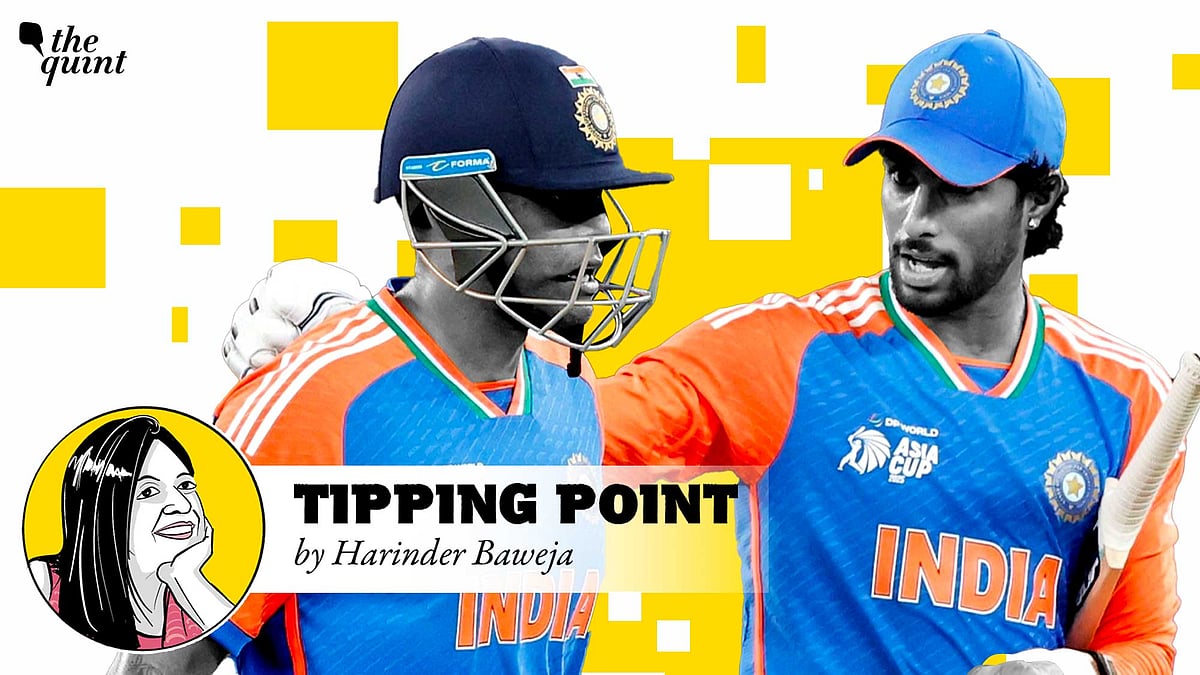
India-Pak Match: Why Make Cricketers Carry the Weight of Nationalism?
The burden of carrying the weight of muscular nationalism was left to the Indian cricketing team.

advertisement
The preliminary India-Pakistan Asia Cup match is done and dusted. India secured a convincing seven wicket win, but did sportsmanship win? The question is important because the series, which has only just begun, is already mired in questions of hyper-nationalism and the two sides could well be facing each other again on 21 September.
On 14 September, the optics were there for all to see: Indian captain Surya Kumar Yadav not shaking hands with his Pakistani counterpart, Salman Agha, after the toss and the Indian team avoiding shaking hands after the win, as is customary practice.
The match itself came amidst boycott calls from families of those who lost their kin in the bone-chilling Pahalgam terror attack. I can understand the pain of the families who asked us Indians to not switch on our television sets. I can understand too, from their perspective, the need to honour the soldiers who took part in Operation Sindoor.
Khel Khel Mein
I have to admit, though, that I watched the match and I did not feel like I was committing an ‘anti-national’ act. We, the common Indian, do not decide the rules of the game; the government does; the Board of Control for Cricket in India (BCCI) and the International Cricket Council (ICC) do.
The same government, which said, “blood and water can’t flow together” was the one that took the unprecedented step of suspending the six-decade-old Indus Water Treaty.
And yes, the same government, through various ministers, informed us that while blood and water can’t flow together, sweat and sport (read cricket) can, because it is obliged to play by the rules when it comes to international matches. It said also that while there would be no bilateral cricket series between India and Pakistan, it had to respect global protocols.
The argument sounds pretentious, even hypocritical.
The breathless studio debates of whether India should play Pakistan had no doubt reached the Indian dressing room and the concerns had, according to media reports, even been addressed by Indian coach Gautam Gambhir.
When it came to the post-match comments and the press conference, the Indian captain was ready to say what the majority wanted to hear. This is what he said:
Time for Pause?
Several questions arise. Are a “few things in life” really ahead of “sportsman spirit?” Has a game of cricket between India and Pakistan become so contentious that Operation Sindoor needs to be showcased at a post-match press conference? None of this happened after Uri and Pulwama.
Let’s also talk about the future, particularly because the Narendra Modi government aspires to be able to host international events. When that happens, will the Pakistani cricket team not be allowed to set foot on Indian soil?
And here, the most difficult of all questions: What if India had lost the Asia Cup game on 14 September? A game, after all, can go either way. It doesn’t need to become a blood sport or a spectacle.
The government is the one that raised the stakes after the Pahalgam attack. It, of course, has the right to respond militarily and diplomatically, as it did on 7 May by striking targets deep within Pakistan. It targeted and destroyed various facilities including the headquarters of the Lashkar-e-Taiba in Muridke and the Jaish-e-Mohammad and minced no words in adding that Operation Sindoor had only been paused. The Prime Minister, in fact, made it clear that future aggressions will be treated as acts of war, be they from state or non-state actors.
I’m not saying India should not take the field. What I am definitely saying is that the men in blue should not be used as human shields; nor should they be the ones having to wave the flag by refusing handshakes in what is essentially considered a gentleman’s game.
Drowing in its Own Noise
The government will ride this one through even though the decibel levels have been raised by its own jingoistic bombast. It is perhaps aware of the dichotomy of its own saber-rattling.
Take, for instance, the poll conducted by CVoter which asked respondents several questions on the issue of India and Pakistan resuming cricketing ties.
But the problem, you see, is that the BCCI won’t openly say it but it earns its revenue from high-octane, Indo-Pak clashes. It is the colour of money that matters and make no mistake, while we are pointed to the direction of the ‘we are going by international protocol’ argument, the cricketing board officials have no qualms in sharing space in the VIP boxes, across stadia.
The men in blue take the field to play a good game of cricket. Getting them to keep their hands to themselves—while the BCCI has its hand in the till— lacks grace and sportsmanship. Converting cricketers into political missiles is plain wrong. That’s not why they chose to wield the bat or the ball.
(Harinder Baweja is a senior journalist and author. She has been reporting on current affairs, with a particular emphasis on conflict, for the last four decades. She can be reached at @shammybaweja on Instagram and X. This is an opinion piece, and the views expressed are the author’s own. The Quint neither endorses nor is responsible for them.)
- Access to all paywalled content on site
- Ad-free experience across The Quint
- Early previews of our Special Projects
Published: undefined